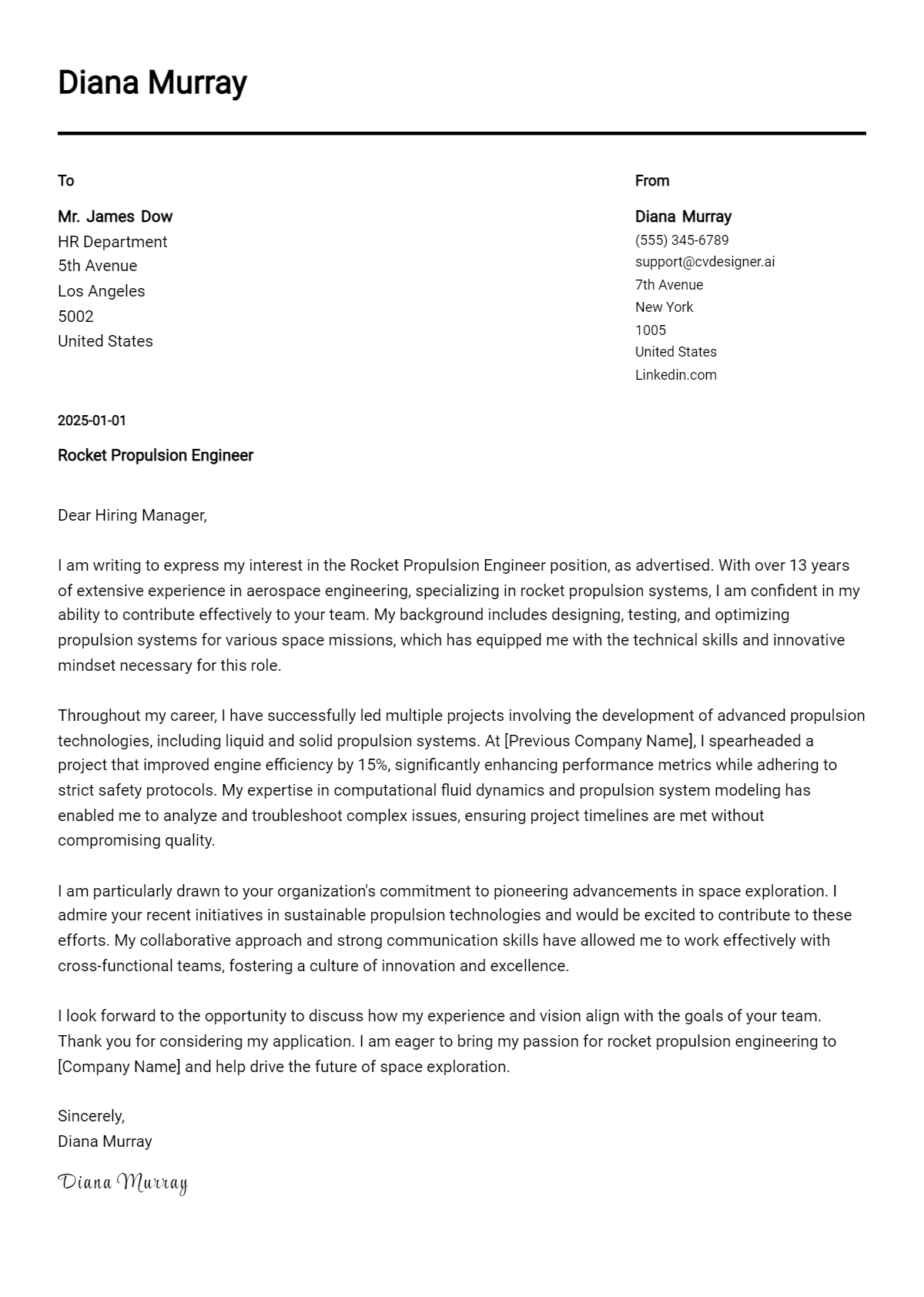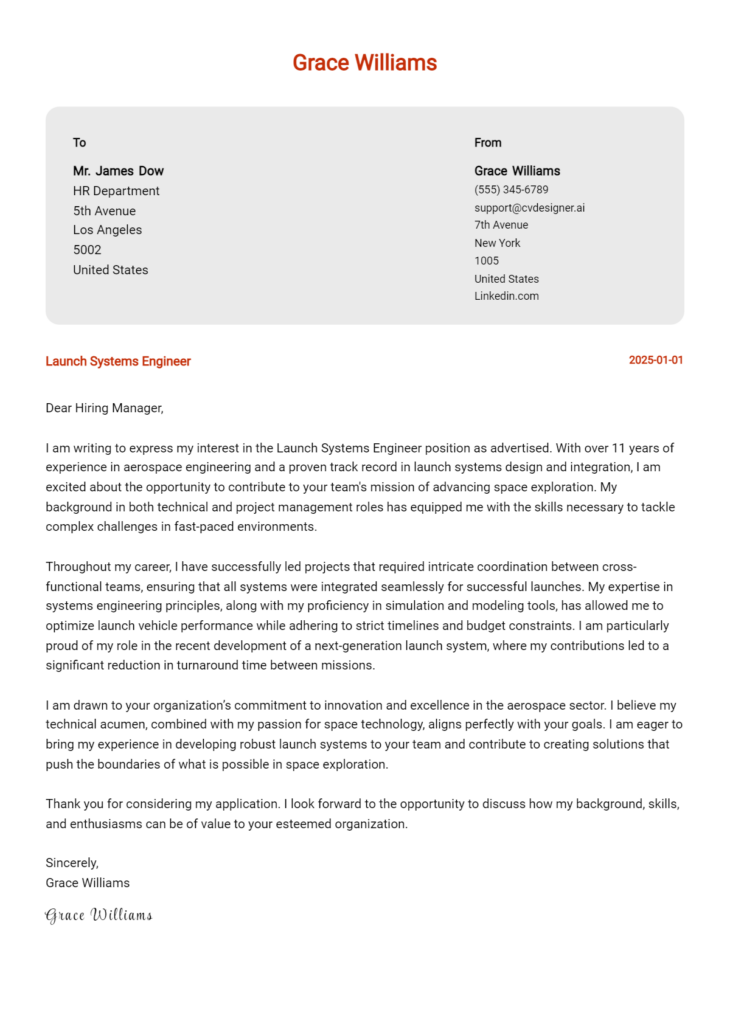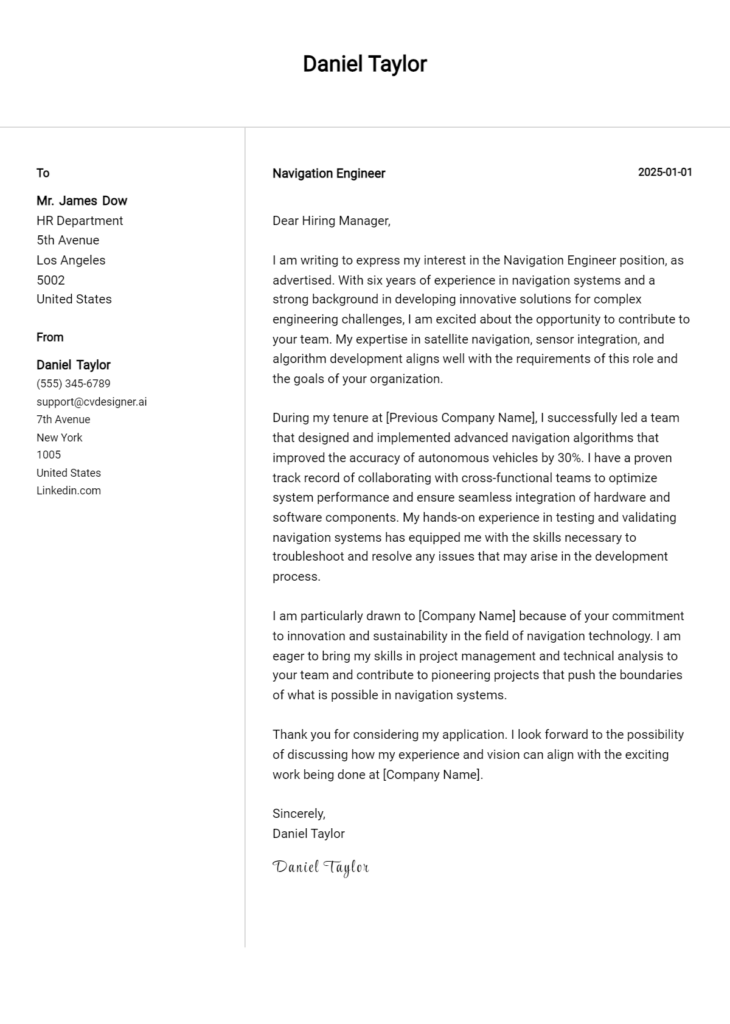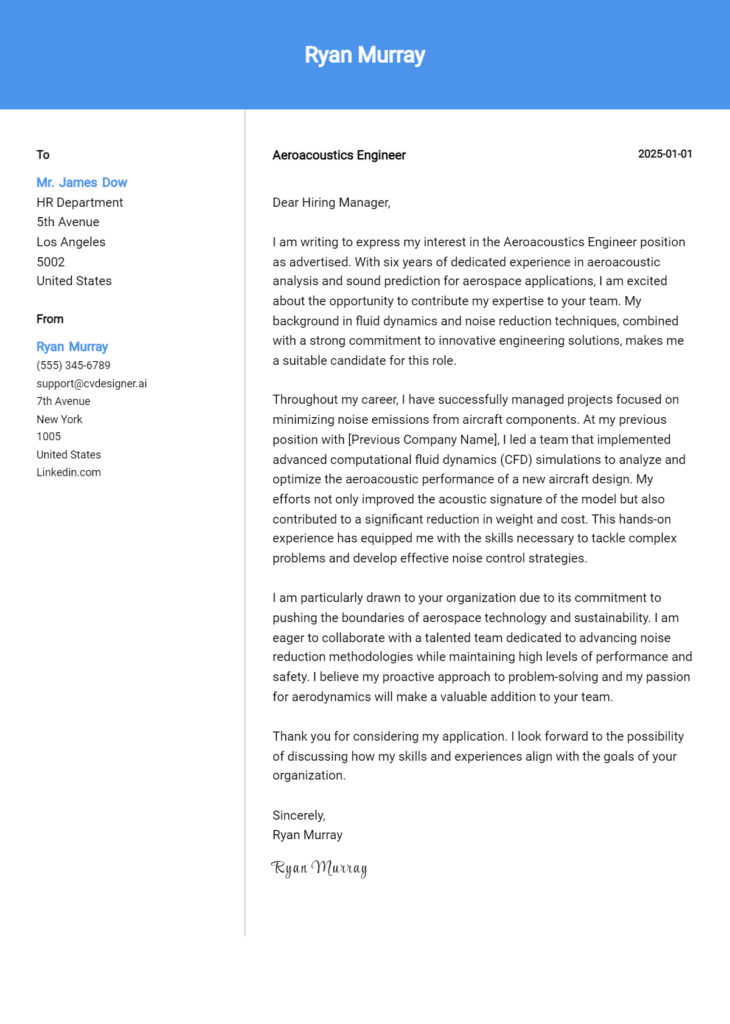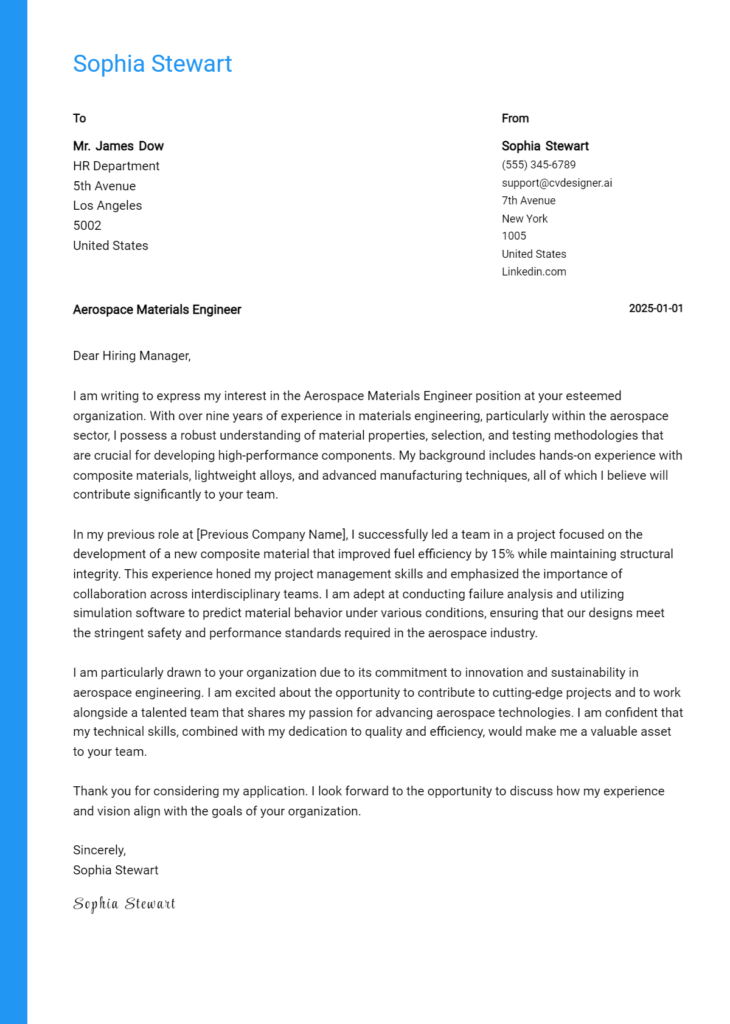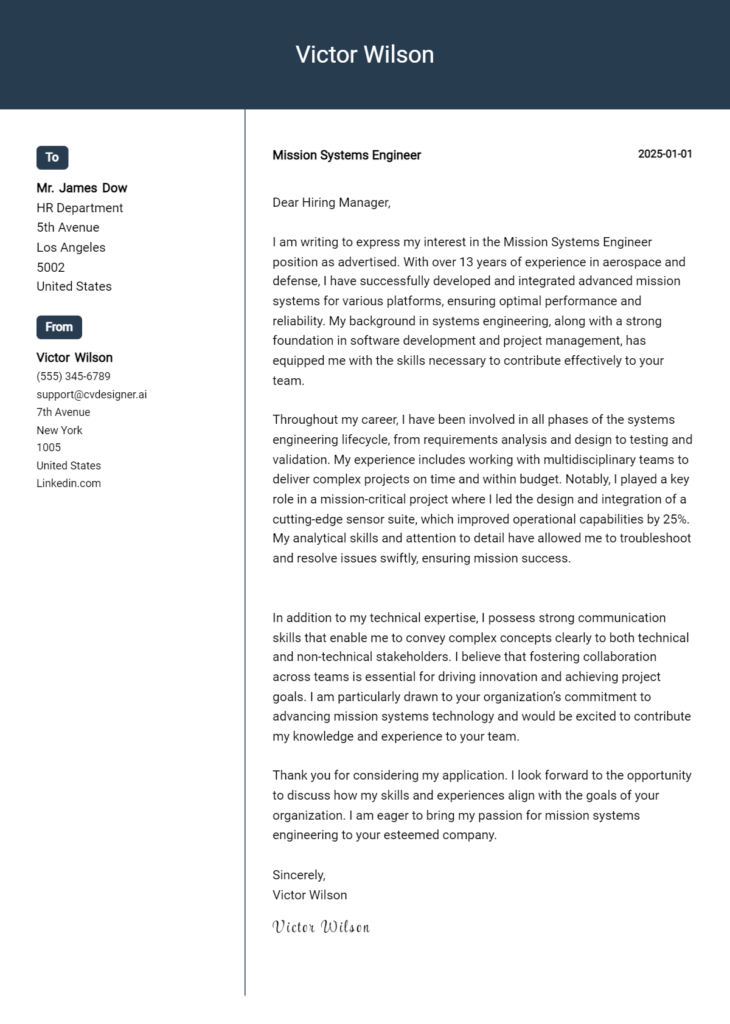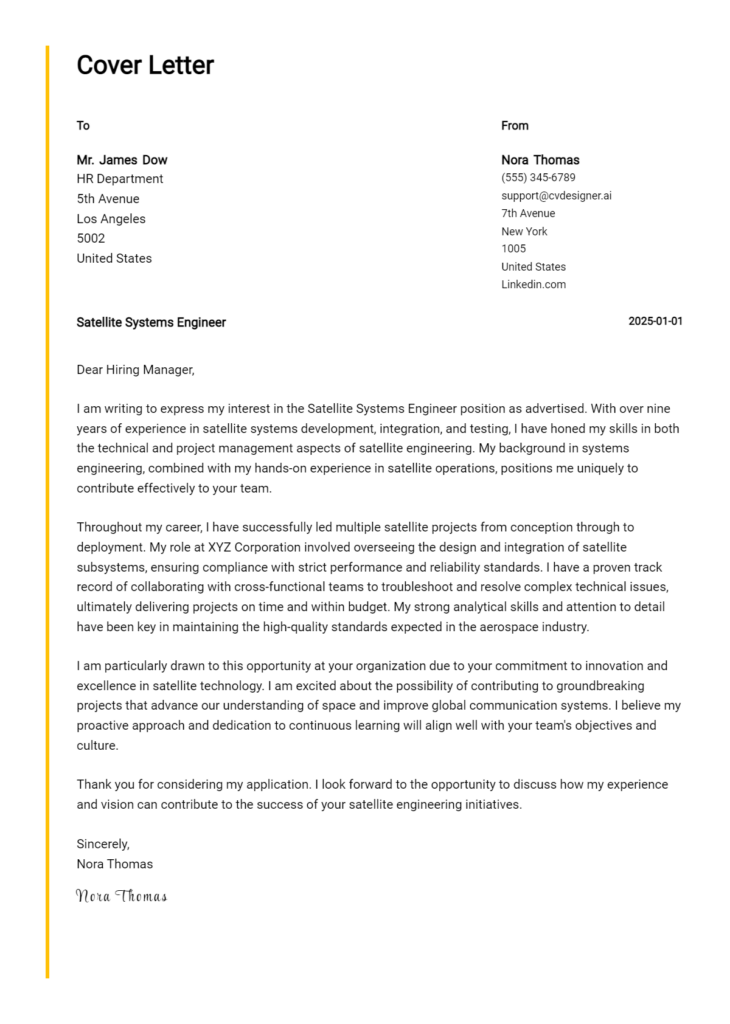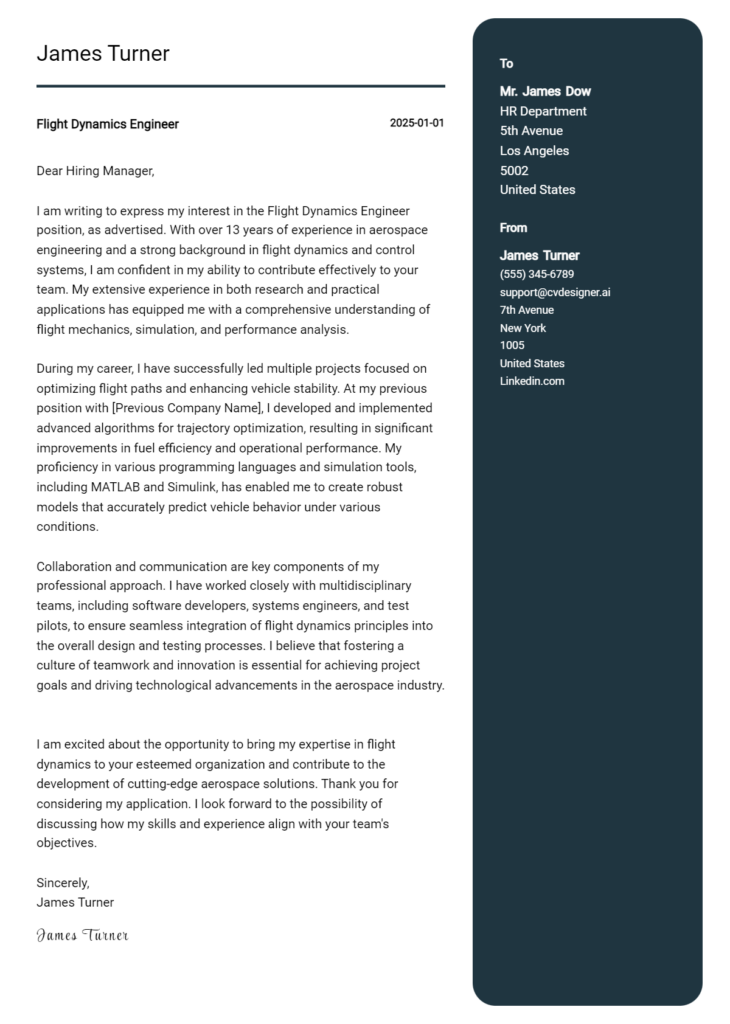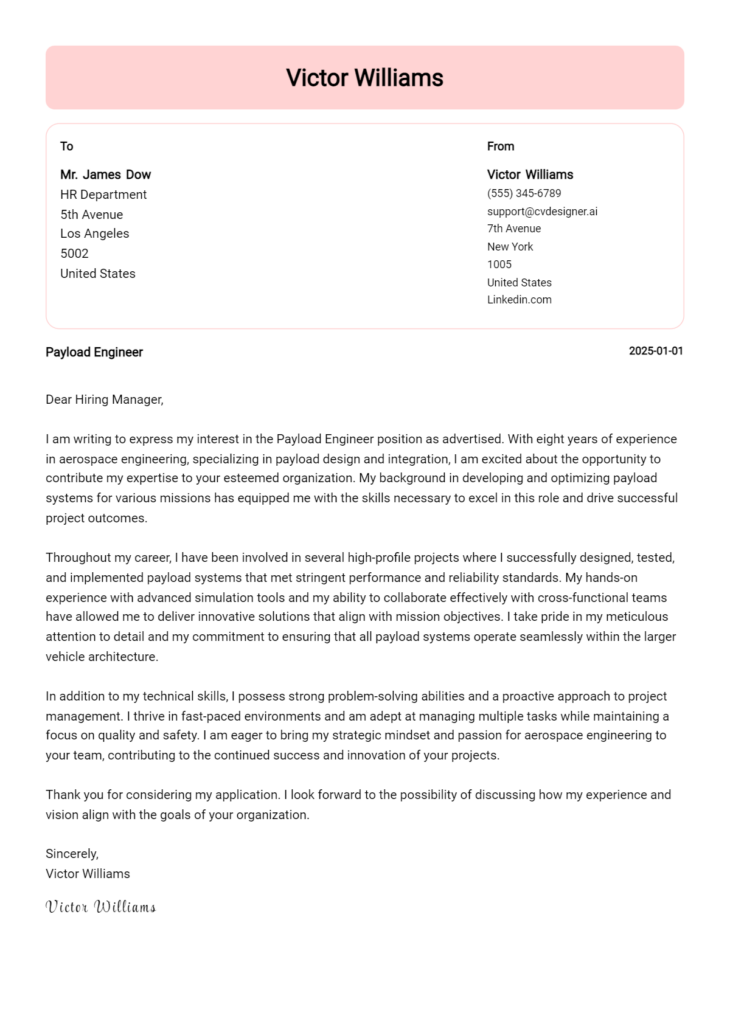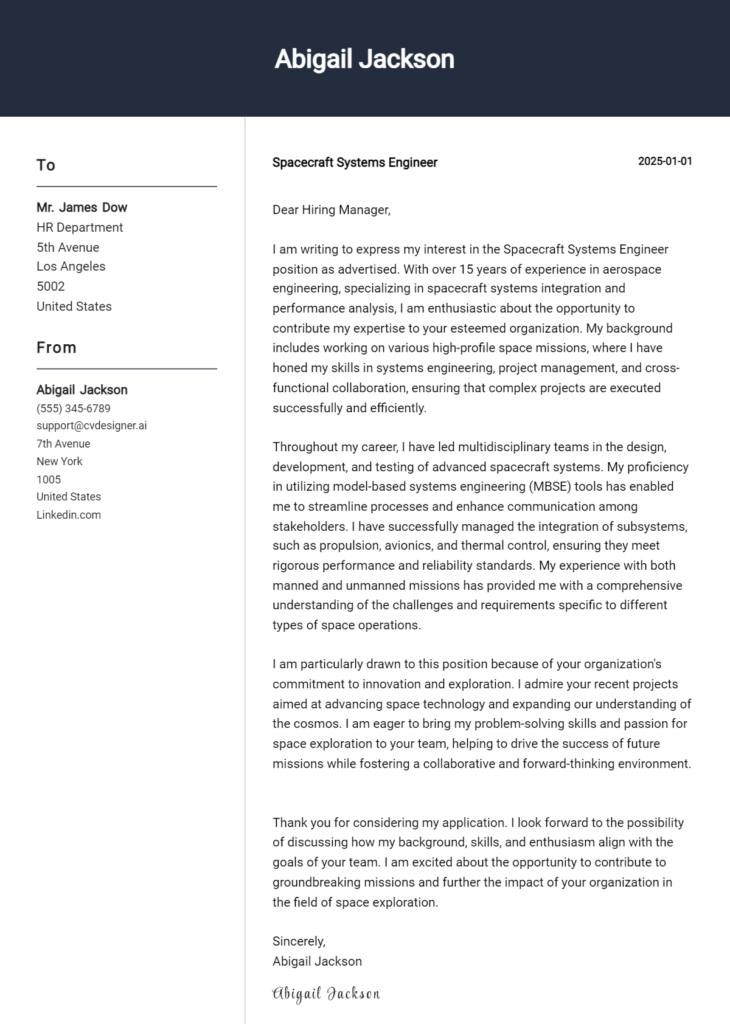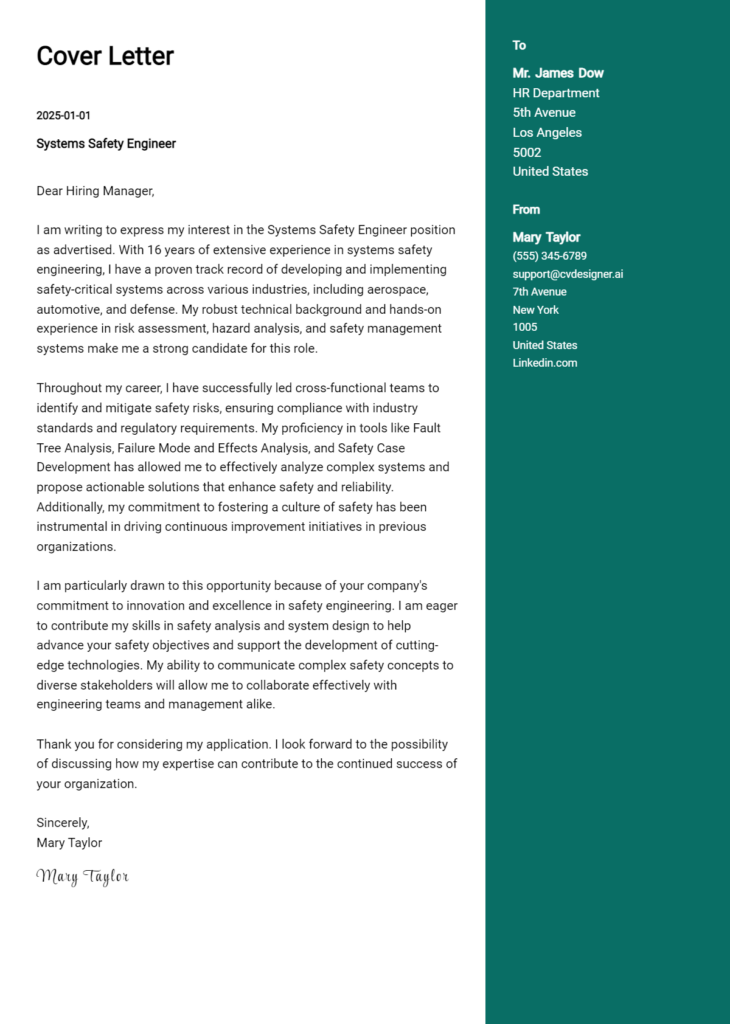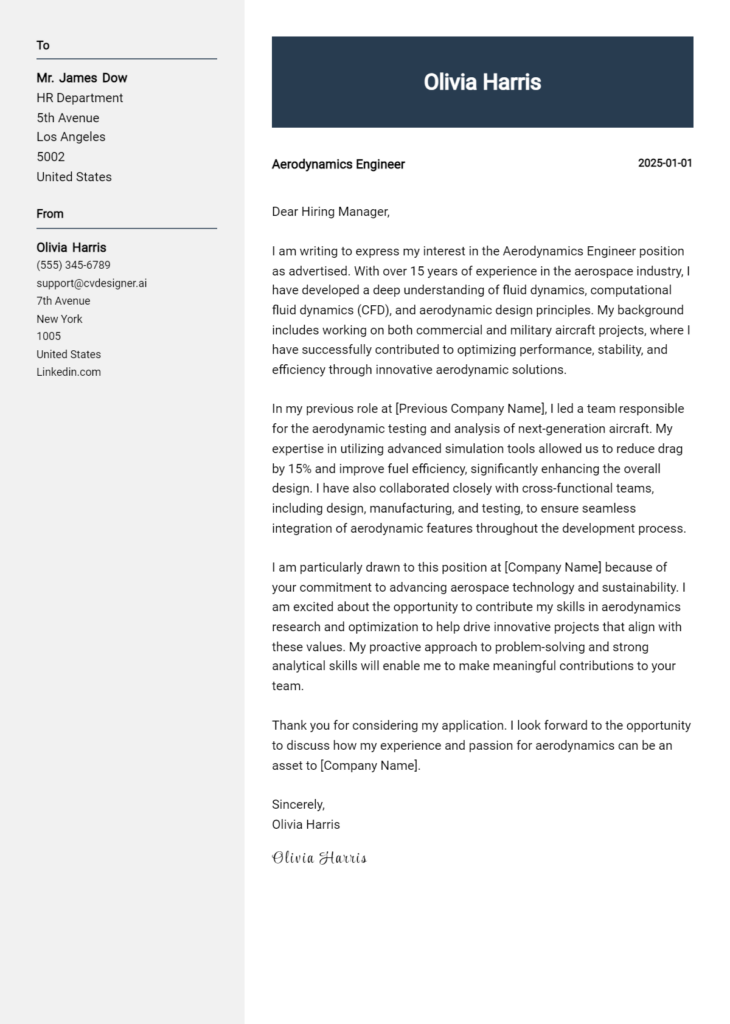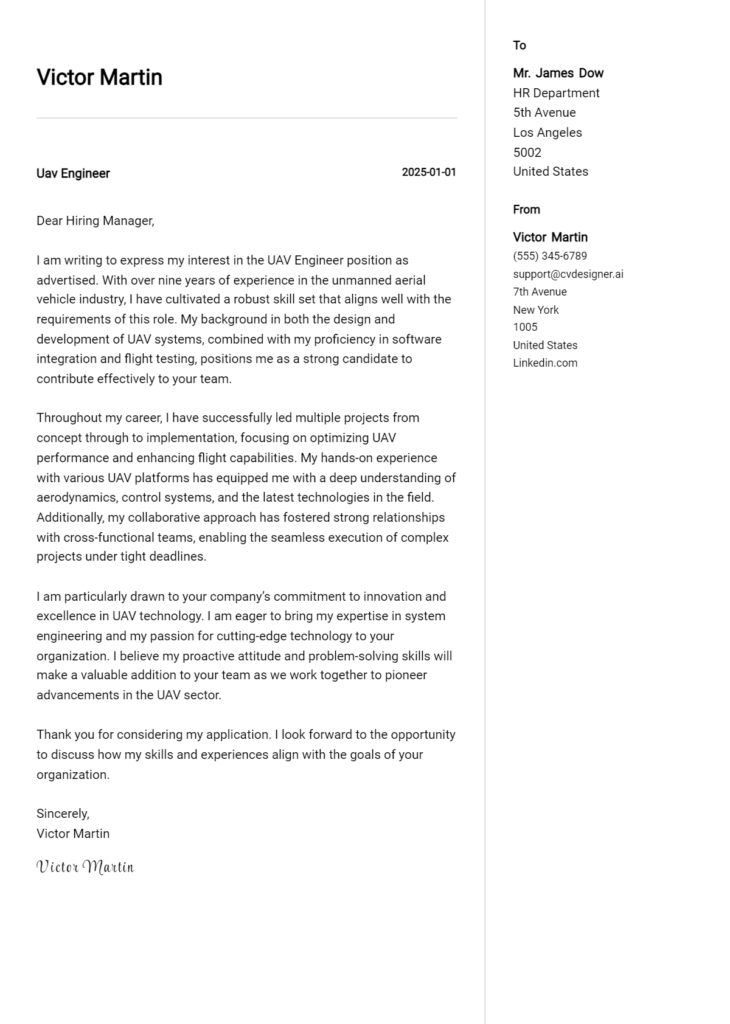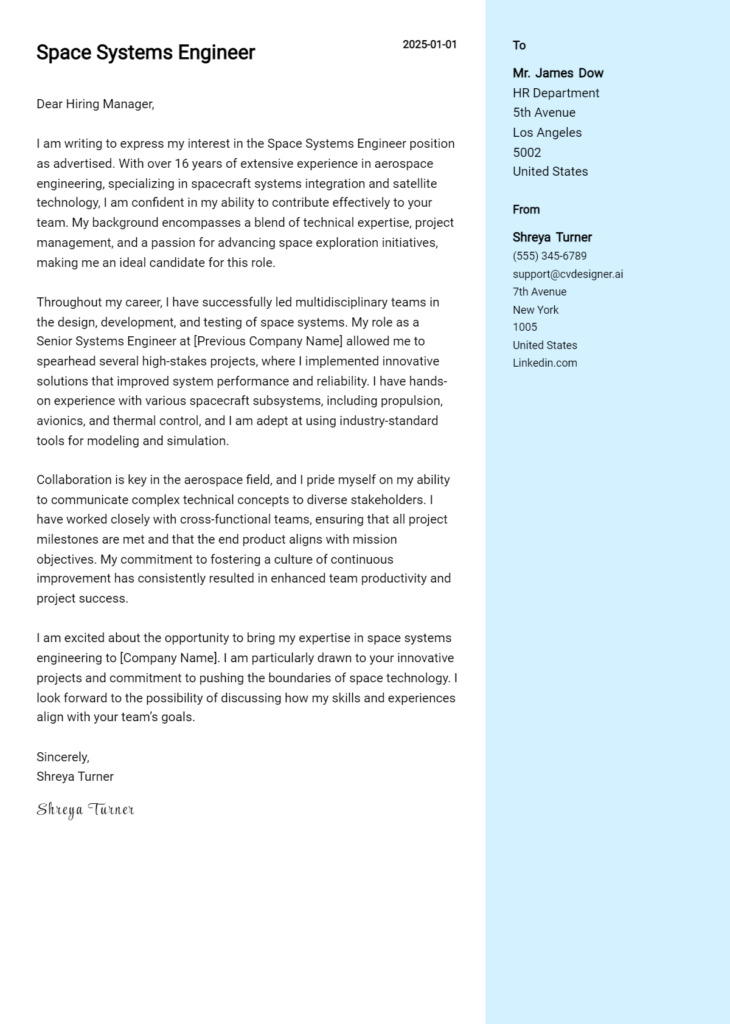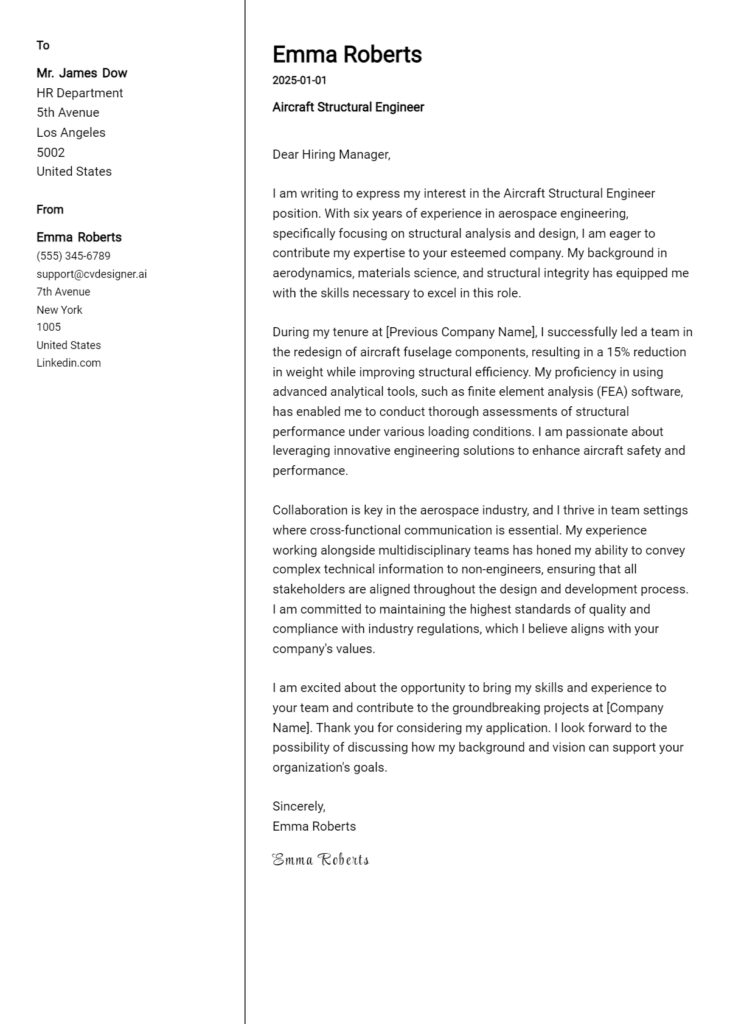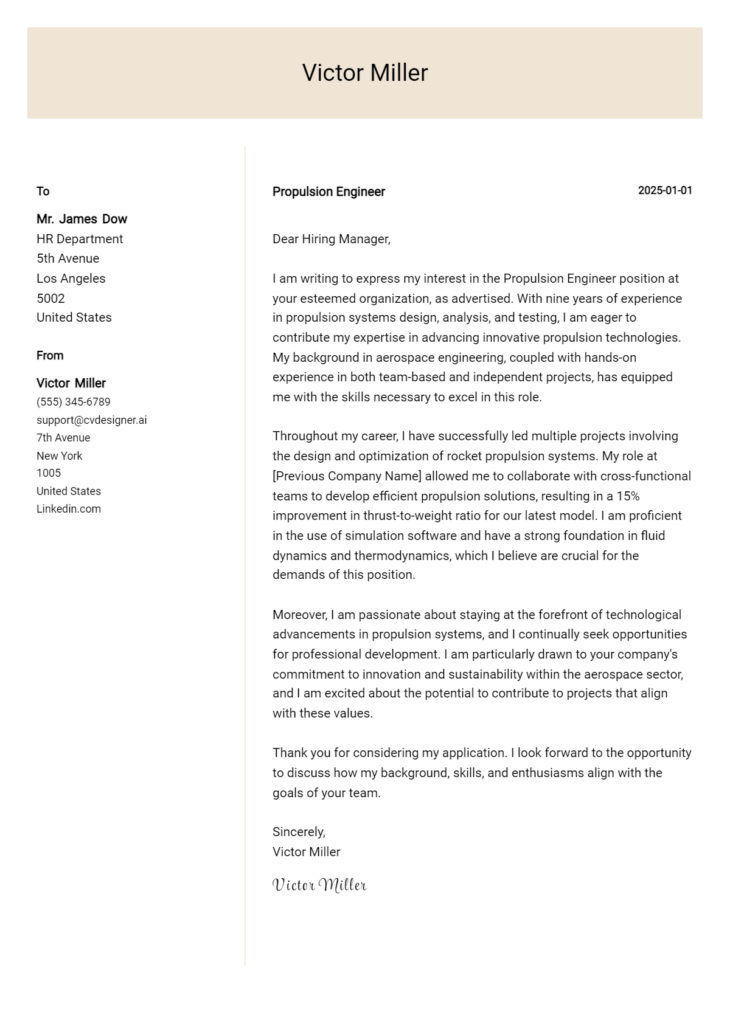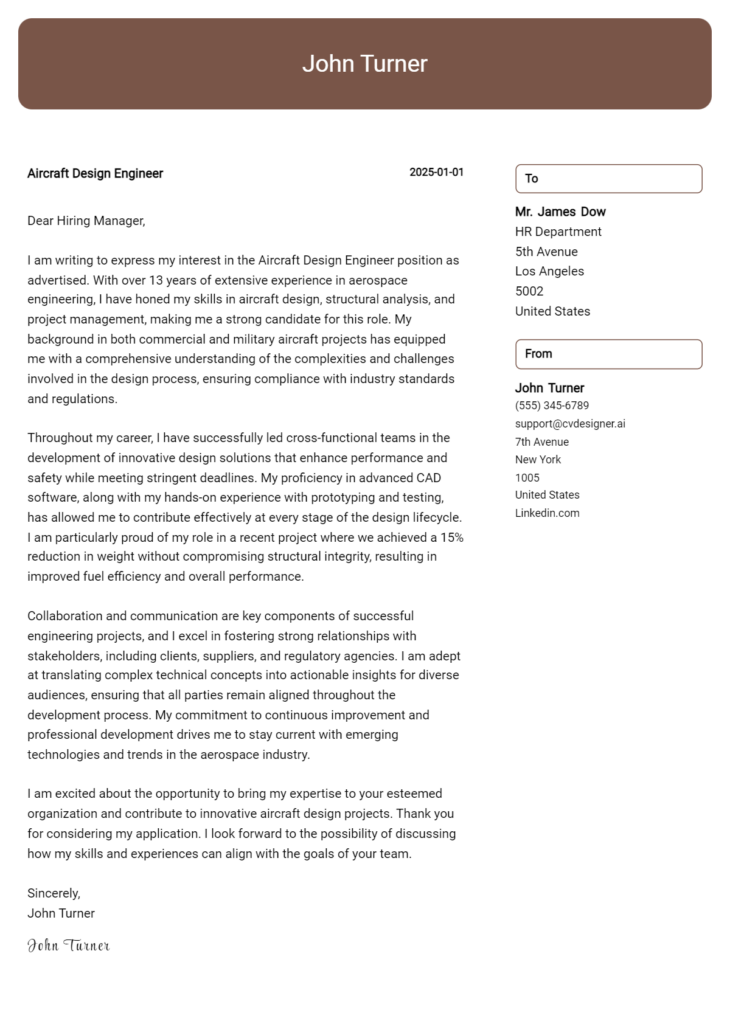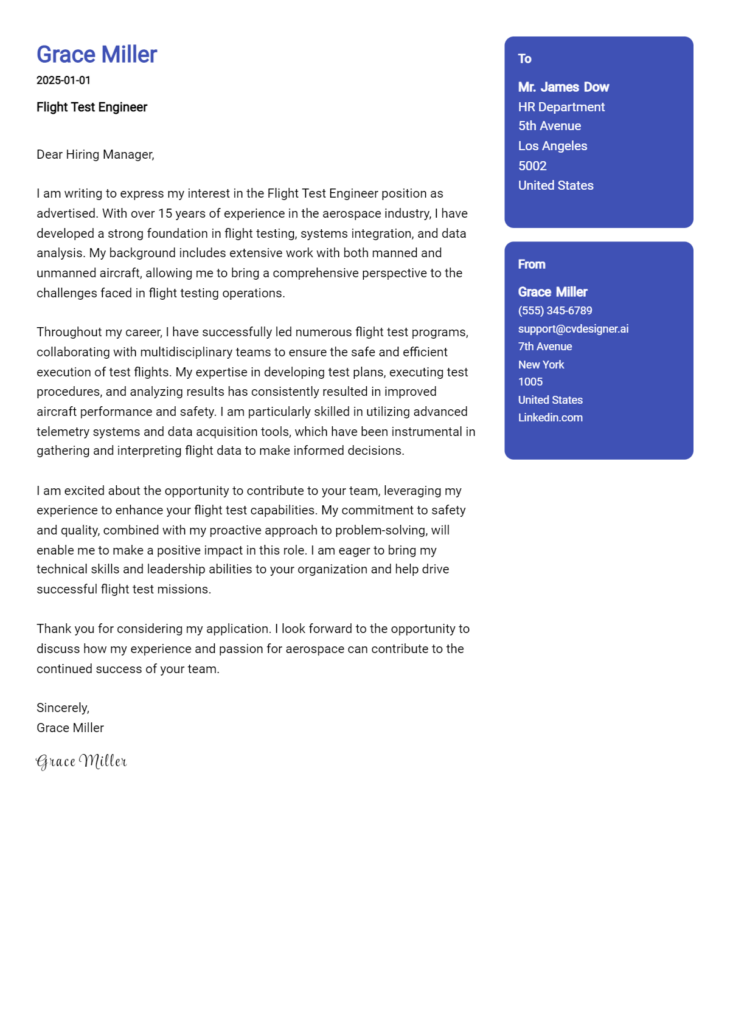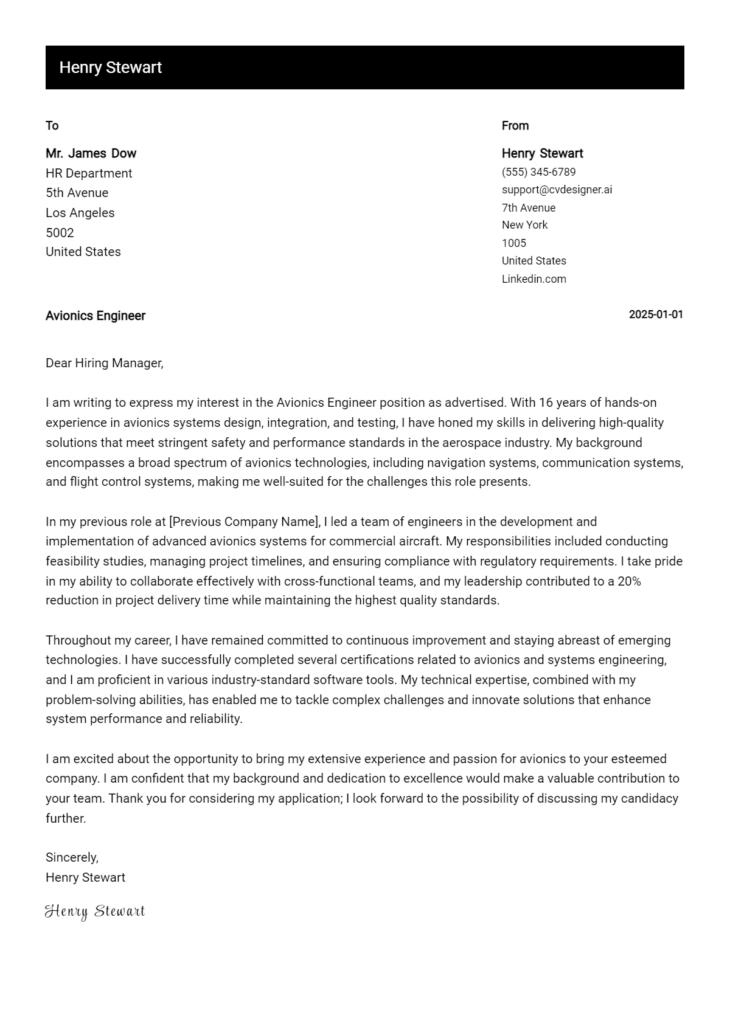Rocket Propulsion Engineer Cover Letter Examples
Explore additional Rocket Propulsion Engineer cover letter samples and guides and see what works for your level of experience or role.
How to Format a Rocket Propulsion Engineer Cover Letter?
Crafting a compelling cover letter as a Rocket Propulsion Engineer is essential, as it not only highlights your technical expertise but also reflects your ability to communicate complex ideas clearly and effectively. A well-structured cover letter captures the attention of hiring managers while demonstrating your analytical skills and innovative mindset—qualities that are paramount in the aerospace industry.
In this guide, we'll outline how to format your cover letter, providing insights and examples tailored specifically for the rocket propulsion field.
We'll delve into the critical components of a professional cover letter, including:
- Cover Letter Header
- Cover Letter Greeting
- Cover Letter Introduction
- Cover Letter Body
- Cover Letter Closing
Each section is vital in showcasing your qualifications and professionalism. Let’s explore how to make your cover letter resonate with potential employers in the aerospace sector.
Importance of the Cover Letter Header for a Rocket Propulsion Engineer
The header of a cover letter is crucial as it sets the tone for the entire document and establishes a professional first impression. For a Rocket Propulsion Engineer, clarity and professionalism in the header are vital, as they reflect attention to detail—an essential trait in the aerospace industry. The header should include your contact information, the date, and the recipient's details. A well-structured header not only aids in clear communication but also demonstrates your organizational skills and respect for the recipient's time.
Strong Example
John Doe 123 Space Lane Rocket City, CA 90210 johndoe@email.com (123) 456-7890 October 1, 2023 Dr. Jane Smith Hiring Manager Aerospace Innovations Inc. 456 Rocket Road Launchville, CA 90211
Weak Example
John D. Email: johndoe@email.com 123 Space Lane 10/1/23 To whom it may concern,
The Importance of a Cover Letter Greeting
A well-crafted cover letter greeting is crucial in establishing a positive first impression and setting the tone for the rest of your letter. It serves as an entry point into your application, demonstrating both professionalism and a personalized touch by addressing the hiring manager directly. A tailored greeting shows that you’ve invested time in researching the company and its team, which can differentiate you from other candidates who may resort to generic salutations. To avoid sounding impersonal, always strive to find the recipient's name through the company website, LinkedIn, or by calling the organization if necessary.
Strong Greeting Example
Dear Dr. Emily Carter,
Weak Greeting Example
To Whom It May Concern,
The Importance of a Compelling Cover Letter Introduction for a Rocket Propulsion Engineer
A well-crafted cover letter introduction is crucial for a Rocket Propulsion Engineer as it sets the tone for the entire application and serves as a first impression to the hiring manager. This introduction should not only capture the reader's attention but also express genuine enthusiasm for the position and the organization. By briefly showcasing key skills or achievements relevant to the role, the candidate can distinguish themselves from the competition. Below are examples of strong and weak cover letter introductions for a Rocket Propulsion Engineer.
Strong Example
Dear [Hiring Manager's Name], As a dedicated Rocket Propulsion Engineer with over five years of experience in designing high-performance propulsion systems, I am excited to apply for the position at [Company Name]. My passion for aerospace engineering, combined with my recent success in developing a state-of-the-art hybrid rocket motor that improved thrust efficiency by 20%, makes me a strong candidate for this role. I am eager to contribute my expertise to [Company Name] and help push the boundaries of space exploration.
Weak Example
To whom it may concern, I am writing to apply for the Rocket Propulsion Engineer position. I have some experience in the field and think I could do a decent job. I hope to make a good impact at your company.
Cover Letter Body for Rocket Propulsion Engineer
The body of a cover letter for a Rocket Propulsion Engineer serves a crucial role in presenting the candidate's skills, experiences, and overall value to the prospective employer. It is an opportunity to delve into specific technical projects, accomplishments, and relevant experiences that demonstrate the candidate's expertise in propulsion systems, fluid dynamics, and thermodynamics. A well-crafted body can effectively convey the candidate's ability to contribute to innovative aerospace projects, highlight problem-solving skills, and showcase teamwork in high-pressure environments. By detailing successful projects, such as developing a new rocket engine that increased efficiency by a significant percentage or leading a team that successfully tested a propulsion system under extreme conditions, candidates can leave a lasting impression on hiring managers.
Strong Example
I am excited to apply for the Rocket Propulsion Engineer position at your esteemed company. In my previous role at Space Innovations Corp, I led a team that designed and tested a new hybrid rocket engine, which achieved a 15% increase in thrust efficiency while reducing fuel consumption by 10%. This project not only enhanced our propulsion capabilities but also received recognition in the aerospace community for its innovative approach. Additionally, my experience with computational fluid dynamics simulations allowed us to optimize the design process, resulting in a more streamlined development timeline. I am eager to bring my technical expertise and passion for aerospace engineering to your team and contribute to the groundbreaking projects at your organization.
Weak Example
I want to apply for the Rocket Propulsion Engineer job. I have worked on some rocket projects before, but I don’t remember all the details. I think I am good at my job because I have a degree in engineering. I am interested in your company and would like to be part of your team. I hope to work on rockets and learn more about propulsion.
Importance of the Cover Letter Closing for a Rocket Propulsion Engineer
The closing paragraph of your cover letter is crucial as it serves to summarize your qualifications, reiterate your enthusiasm for the position, and encourage the hiring manager to take the next steps, such as reviewing your resume or scheduling an interview. A strong closing leaves a lasting impression and solidifies your interest in the role, while a weak closing can diminish the overall impact of your application.
Strong Example
Thank you for considering my application for the Rocket Propulsion Engineer position. With my extensive background in propulsion system design, coupled with my passion for aerospace innovation, I am excited about the opportunity to contribute to your team at [Company Name]. I look forward to discussing how my skills can help advance your projects further. Please feel free to review my resume, and I hope to schedule an interview soon to explore this opportunity in greater detail.
Weak Example
I hope you look at my resume. I think I might be a good fit for the job. Let me know if you want to chat.
These tips will help candidates craft an effective cover letter for a Rocket Propulsion Engineer position. As this role requires a deep understanding of complex engineering principles, it is crucial to showcase not only technical skills but also problem-solving abilities, knowledge of the Software Development Life Cycle (SDLC), teamwork, and a passion for continuous learning. A well-structured cover letter can set you apart from other applicants and highlight your unique qualifications for this specialized field.
Tips for Writing an Effective Cover Letter
Highlight Technical Skills
Clearly outline your technical expertise relevant to rocket propulsion, such as experience with propulsion systems, fluid dynamics, and thermodynamics. Use specific examples from past projects to demonstrate how these skills contributed to successful outcomes. Tailoring your cover letter to include keywords from the job description can also catch the employer's attention.Showcase Problem-Solving Abilities
Rocket propulsion engineering often involves overcoming significant challenges. Share a brief narrative of a technical problem you faced in a previous role and detail the steps you took to resolve it. This will illustrate your analytical thinking and ability to innovate under pressure, qualities that are highly sought after in this field.Demonstrate Knowledge of SDLC
If your role involves software components, mention your familiarity with the Software Development Life Cycle (SDLC). Discuss how your understanding of SDLC principles has helped streamline project workflows or improve the efficiency of propulsion systems. This shows your capability to integrate software solutions within engineering processes.Emphasize Teamwork and Collaboration
Rocket propulsion projects often require interdisciplinary collaboration. Use your cover letter to highlight your experience working in teams, focusing on your communication skills and your role in fostering a collaborative environment. Mention specific projects where you worked alongside engineers, scientists, or other stakeholders to achieve common goals.Express a Passion for Continuous Learning
The field of rocket propulsion is constantly evolving, and employers value candidates who are committed to ongoing education and professional development. Mention any relevant certifications, workshops, or courses you've completed. Additionally, express your enthusiasm for staying updated on industry advancements and your desire to contribute to innovative projects.
By following these tips, you can create a compelling cover letter that reflects your qualifications and enthusiasm for the role of Rocket Propulsion Engineer. If you need further assistance, consider using cover letter templates or a cover letter builder to streamline the writing process.
Common Mistakes to Avoid in a Rocket Propulsion Engineer Cover Letter
Crafting a compelling cover letter is essential for any Rocket Propulsion Engineer seeking to stand out in a competitive job market. Avoiding common mistakes can significantly enhance your chances of making a positive impression on potential employers. Here are some frequent pitfalls and tips on how to steer clear of them:
Generic Greetings: Using "To Whom It May Concern" can make your application seem impersonal. Instead, try to find the hiring manager’s name to personalize your greeting.
Lack of Specificity: Failing to mention specific projects or experiences relevant to the rocket propulsion field can weaken your application. Tailor your letter to highlight pertinent skills and accomplishments.
Overly Technical Language: While industry jargon is important, excessive technical language can alienate non-technical hiring managers. Balance your technical expertise with clear, accessible language.
Ignoring the Job Description: Not aligning your cover letter with the job requirements is a missed opportunity. Carefully read the job description and incorporate relevant keywords and experiences.
Too Lengthy or Too Short: A cover letter that is either too long or too brief can detract from your message. Aim for a concise format that is one page in length, clearly outlining your qualifications.
Neglecting Formatting: A disorganized cover letter can be unappealing. Utilize a clear format that enhances readability, such as proper spacing and professional fonts. For tips on proper structure, check out this cover letter format.
Spelling and Grammar Errors: Mistakes in spelling or grammar can undermine your professionalism. Always proofread your letter and consider having someone else review it for you.
For inspiration, explore various cover letter examples to see how to effectively showcase your skills and experiences. By avoiding these common mistakes, you can create a strong cover letter that enhances your candidacy as a Rocket Propulsion Engineer.
Cover Letter FAQs for Rocket Propulsion Engineer
What should I include in my cover letter for a Rocket Propulsion Engineer position?
Your cover letter should highlight your technical expertise in rocket propulsion systems, including any specialized skills in propulsion design, testing, and analysis. Begin with a strong introduction that states your interest in the position and briefly mentions your educational background, such as a degree in aerospace engineering. Include specific examples of relevant projects or experiences, like internships or research, that demonstrate your problem-solving abilities and teamwork. It’s also beneficial to mention any software proficiency (e.g., MATLAB, ANSYS) and your familiarity with industry standards. Finally, express your enthusiasm for the role and the company, showing that you’ve researched their goals and projects.
How can I demonstrate my passion for rocket propulsion in my cover letter?
To convey your passion for rocket propulsion, share personal anecdotes or experiences that ignited your interest in the field. For instance, discuss a pivotal moment during your education, such as a project where you designed a propulsion system or participated in a rocket launch competition. You can also mention any involvement in professional organizations related to aerospace or propulsion, such as AIAA (American Institute of Aeronautics and Astronautics). Additionally, expressing your excitement about current advancements in the industry and how they inspire you can reinforce your commitment. Make sure your enthusiasm shines through your language, using active and engaging verbs.
How long should my cover letter be for a Rocket Propulsion Engineer job?
Your cover letter should ideally be one page long, formatted with clear, concise paragraphs. Aim for about 3 to 5 paragraphs that detail your qualifications, experiences, and motivation for applying. Start with a compelling introduction, followed by body paragraphs that elaborate on your skills and achievements relevant to the job. The conclusion should reiterate your interest and invite the employer to discuss your application further. Keeping it to one page ensures you respect the hiring manager's time while still providing enough detail to showcase your qualifications effectively.
Should I customize my cover letter for each job application?
Absolutely, customizing your cover letter for each job application is crucial. Tailor your content to align with the specific requirements and responsibilities outlined in the job description. Highlight experiences and skills that directly relate to the company's projects or focus areas in rocket propulsion. Using keywords from the job listing can also demonstrate your attention to detail and genuine interest. Additionally, researching the company culture and recent developments can help you align your values with theirs, making your application more compelling. A personalized cover letter signals to employers that you are serious about the opportunity and have taken the time to understand their needs.
Build your Cover Letter in minutes
Use an AI-powered cover letter builder and have your letter done in 5 minutes. Just select your template and our software will guide you through the process.

